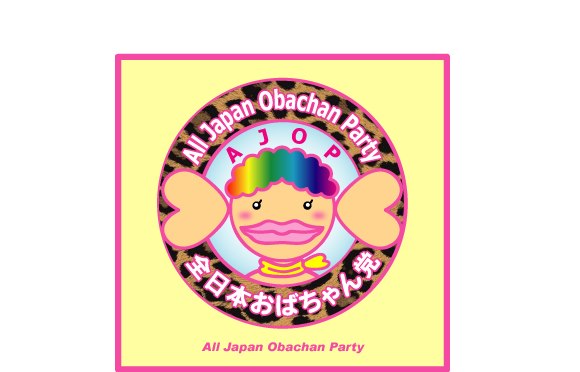
In Japanese, obachan is a word that means aunt, but is sometimes used to refer to a middle-aged or elderly woman in a derogatory way. There is no good translation in English, but the image is of an eccentric, loud, irritating busybody long past youth or beauty. Not many women would choose to apply this word to themselves, but a new political party has emerged out of Osaka that is proudly claiming ownership of the word and attempting to reform the image of Japan’s obachans. We went to find out more about this All Japan Obasan Party.
Vice Presidents Hiroko Inokuma, a journalist and professor at Tokyo City University, and Tomoko Saotome, an obstetrician and gynecologist, spoke at Tokyo’s Foreign Correspondents Club to introduce their party and what they hope to accomplish for women in Japan. They were joined by member Kyoko Takada, a university professor.
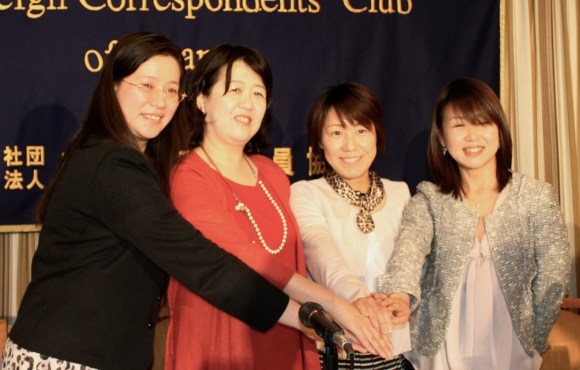
(from left to right) Tomoko Saotome, Hiroko Inukuma, Kyoko Takada and another member
AJOP was started just six months ago and sprang out of a Facebook group, but has quickly grown to over 2,000 members. According to the speakers, the larger purpose of AJOP is to close the gender gap in Japanese society, but they are starting much smaller by just providing a forum where women can talk politics, learn to express themselves effectively and raise awareness about how politics are connected to their daily lives, all without any quelling male presence.
The need to encourage women to speak their minds might seem like a hopelessly outdated idea, but despite Japan’s modern image, conservative notions about gender roles are still alive and well in the society.
“If we particularly focus on comments given by our regional members, people who live in rural areas, quite often women say that they have been prohibited from speaking out about politics or even having an opinion about politics. Quite often, the pressure comes from the mother-in-law, who takes a very strong stance that women should stay in the home and not think about or talk about politics,” says Inokuma.
“The first thing these women realize when they join our forums is that they can talk about these things, they can have an opinion, and it’s really a revelation for them.”
Last year, Japan ranked 101 out of 135 in the World Economic Forum’s Global Gender Gap Rankings, the lowest by far of all the G8 nations and just above countries like Nigeria, Kuwait and the UAE. The percentage of female legislators hovers around just 13 percent, depending on what levels of government are included, and this astounding gender gap persists despite a highly educated female majority.
The AJOP membership covers the spectrum of political opinion, so it’s hard to say that they have a platform in the traditional sense, but they do have eight points they would like to promote, which they are calling the obachan hassaku or Auntie’s Oranges, a pun on the Japan Restoration Party’s much touted ishin hassaku or Eight Policies for Restoration.
The Obachan Hassaku
1. No more lives of children wasted in war
2. Tax reform asking the wealthy to pay their fair share
3. Recovery from natural disasters
4. No more nuclear waste
5. Strengthen the community to better raise children and help seniors
6. Protect workers and their rights
7. Minority opinions should be taken seriously
8. The opinion of obachans should be reflected in politics
The platform is perhaps on the vague side, without specific targets or timelines, but the obachans warn against falling back on prefixed ideas of what a political organization should be.
“What we are trying to propose is another kind of organization, very different from the male-oriented or male-designed organizations we’ve had in the past,” says Saotome.
“There is a term in Japan idobata kaigi, or a chat around the village well. In other words, women doing their washing and exchanging opinions. We are thinking about an organization that is much looser in form.”
Still, the speakers cautioned that they are only six months in and AJOP is still very much in flux as the membership grows and defines itself.
Perhaps more details will be forthcoming at this weekend’s first event in Tokyo, which will be held on Saturday, March 16th from 2-5pm in Ikegami. The obachans tell us they will be announcing their strategic “big-bellied policy,” another pun on the government’s recent revival of the “big-boned policy.”
One thing is for sure: these ladies have a sense of humor, despite their earnest goals. Oh, and if you men were feeling a bit left out in all this, the AJOP has an ancillary support group for men called the O-chan (uncle) Supporters.
Images: RocketNews24 and AJOP Facebook page
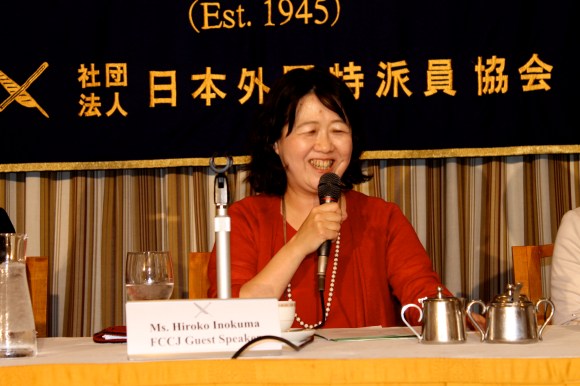
Laughs abounded even as they discussed the serious topic of gender equality.
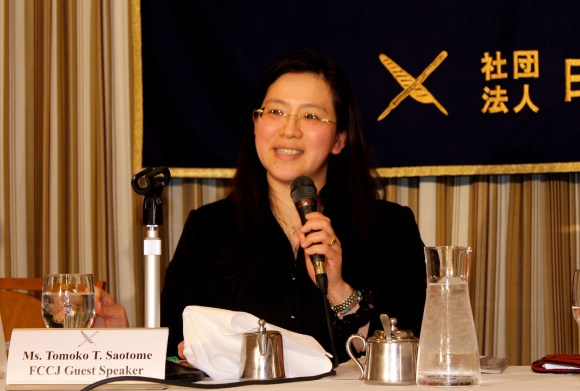
Saotome discusses working as a woman OB/GYN, a field still dominated by men in Japan.
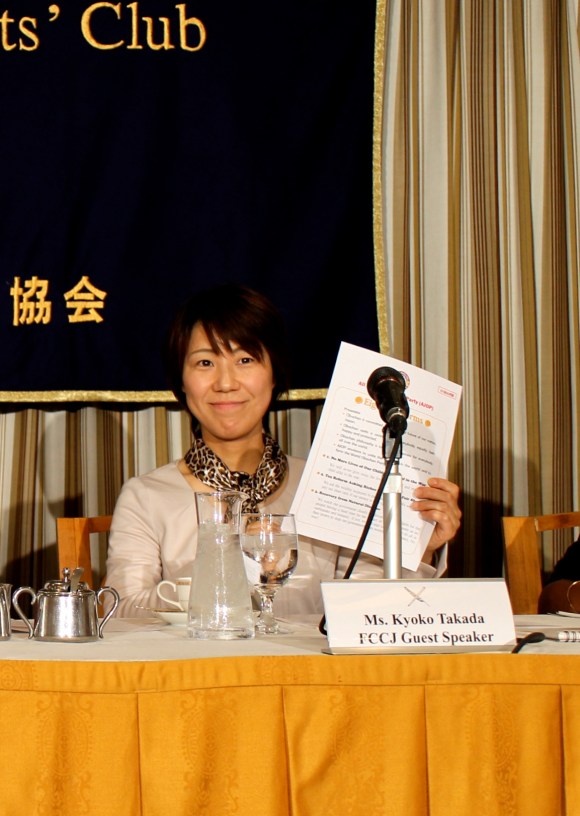
Takada holds up the obachan hassaku
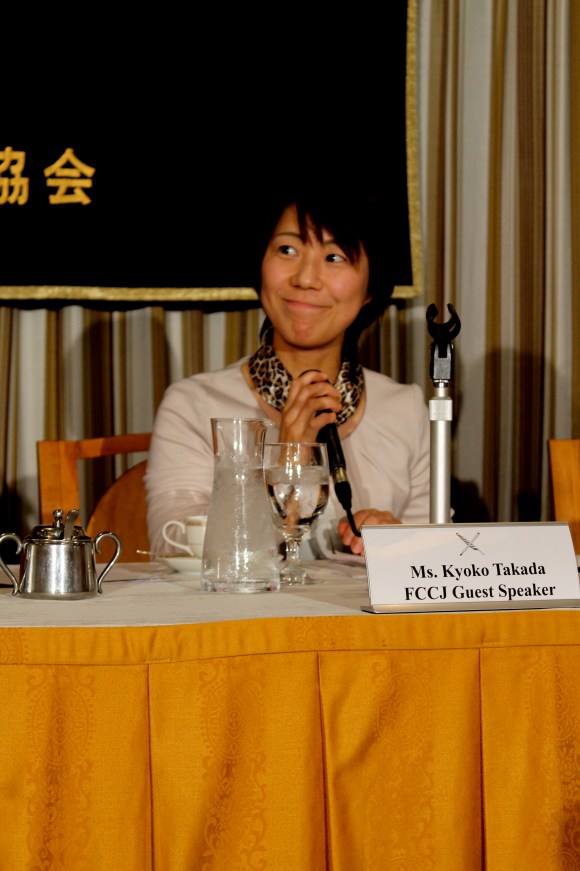
Notice the leopard print scarf. This is a symbol the group has appropriated from the negative image of an Osaka obachan, who are said to be rather garish dressers.
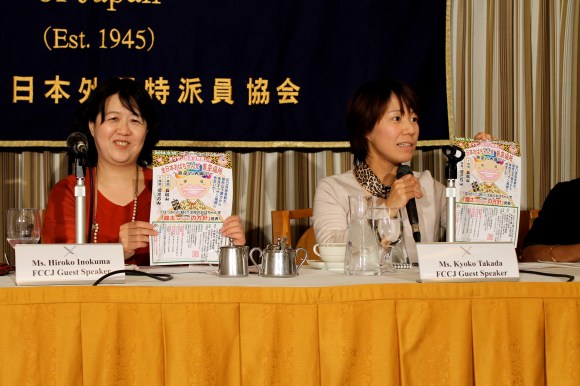
The ladies hold up a flyer for tomorrow’s event, designed to look like a sumo tournament poster.

What self-respecting obasan would go out without a shopping bag?

And there’s some more of that lovely animal print.

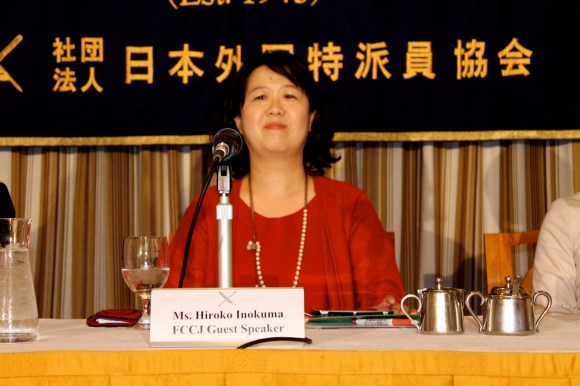
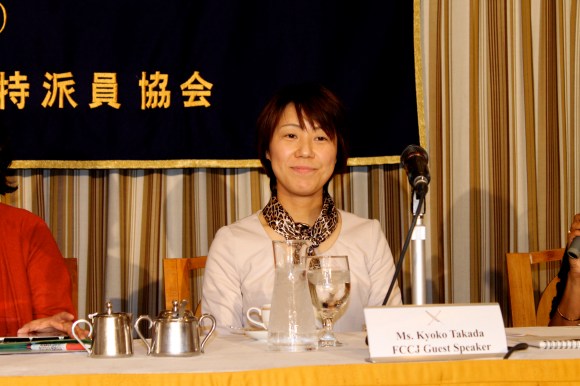
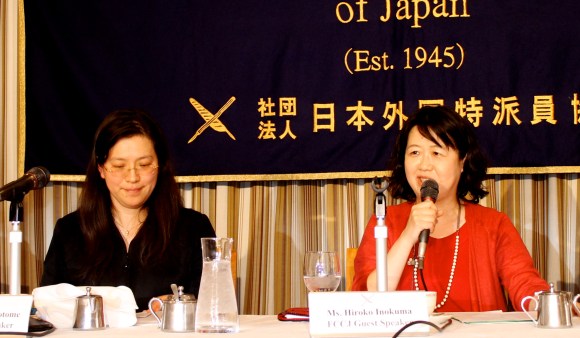
 Forget geisha and samurai, experience Japan by dressing up as an Osaka Obachan
Forget geisha and samurai, experience Japan by dressing up as an Osaka Obachan Nike commercial about gender inequality in Japan receives backlash online【Video】
Nike commercial about gender inequality in Japan receives backlash online【Video】 Which Japanese prefecture buys the most leopard print clothes?
Which Japanese prefecture buys the most leopard print clothes? Change your perspective: A quartet of videos from little-known Japan
Change your perspective: A quartet of videos from little-known Japan What Japanese women really think about the gender gap in Japan【Video】
What Japanese women really think about the gender gap in Japan【Video】 McDonald’s new Happy Meals offer up cute and practical Sanrio lifestyle goods
McDonald’s new Happy Meals offer up cute and practical Sanrio lifestyle goods Studio Ghibli glasses cases let anime characters keep an eye on your spectacles
Studio Ghibli glasses cases let anime characters keep an eye on your spectacles All-you-can-drink Starbucks and amazing views part of Tokyo’s new 170 meter-high sky lounge
All-you-can-drink Starbucks and amazing views part of Tokyo’s new 170 meter-high sky lounge Super Nintendo World expansion gets delayed for several months at Universal Studios Japan
Super Nintendo World expansion gets delayed for several months at Universal Studios Japan Beautiful Sailor Moon manhole cover coasters being given out for free by Tokyo tourist center
Beautiful Sailor Moon manhole cover coasters being given out for free by Tokyo tourist center Kyoto’s 100 Demons yokai monster parade returns!
Kyoto’s 100 Demons yokai monster parade returns! More foreign tourists than ever before in history visited Japan last month
More foreign tourists than ever before in history visited Japan last month The oldest tunnel in Japan is believed to be haunted, and strange things happen when we go there
The oldest tunnel in Japan is believed to be haunted, and strange things happen when we go there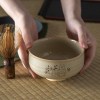 Studio Ghibli adds magic to your matcha with new tea ceremony whisk and bowl
Studio Ghibli adds magic to your matcha with new tea ceremony whisk and bowl The top 11 Japanese summer festivals, according to travellers
The top 11 Japanese summer festivals, according to travellers Disney princesses get official manga makeovers for Manga Princess Cafe opening in Tokyo
Disney princesses get official manga makeovers for Manga Princess Cafe opening in Tokyo Starbucks reopens at Shibuya Scramble Crossing with new look and design concept
Starbucks reopens at Shibuya Scramble Crossing with new look and design concept Beautiful new Final Fantasy T-shirt collection on the way from Uniqlo【Photos】
Beautiful new Final Fantasy T-shirt collection on the way from Uniqlo【Photos】 Is the new Shinkansen Train Desk ticket worth it?
Is the new Shinkansen Train Desk ticket worth it? Foreign English teachers in Japan pick their favorite Japanese-language phrases【Survey】
Foreign English teachers in Japan pick their favorite Japanese-language phrases【Survey】 Japanese convenience store packs a whole bento into an onigiri rice ball
Japanese convenience store packs a whole bento into an onigiri rice ball We try out “Chan Ramen”, an underground type of ramen popular in the ramen community
We try out “Chan Ramen”, an underground type of ramen popular in the ramen community Studio Ghibli releases Kiki’s Delivery Service chocolate cake pouches in Japan
Studio Ghibli releases Kiki’s Delivery Service chocolate cake pouches in Japan Japan’s bone-breaking and record-breaking roller coaster is permanently shutting down
Japan’s bone-breaking and record-breaking roller coaster is permanently shutting down New definition of “Japanese whiskey” goes into effect to prevent fakes from fooling overseas buyers
New definition of “Japanese whiskey” goes into effect to prevent fakes from fooling overseas buyers Our Japanese reporter visits Costco in the U.S., finds super American and very Japanese things
Our Japanese reporter visits Costco in the U.S., finds super American and very Japanese things Studio Ghibli unveils Mother’s Day gift set that captures the love in My Neighbour Totoro
Studio Ghibli unveils Mother’s Day gift set that captures the love in My Neighbour Totoro Foreign passenger shoves conductor on one of the last full runs for Japan’s Thunderbird train
Foreign passenger shoves conductor on one of the last full runs for Japan’s Thunderbird train Domino’s Japan now sells…pizza ears?
Domino’s Japan now sells…pizza ears? New Japanese KitKat flavour stars Sanrio characters, including Hello Kitty
New Japanese KitKat flavour stars Sanrio characters, including Hello Kitty Kyoto creates new for-tourist buses to address overtourism with higher prices, faster rides
Kyoto creates new for-tourist buses to address overtourism with higher prices, faster rides Sales of Japan’s most convenient train ticket/shopping payment cards suspended indefinitely
Sales of Japan’s most convenient train ticket/shopping payment cards suspended indefinitely Sold-out Studio Ghibli desktop humidifiers are back so Totoro can help you through the dry season
Sold-out Studio Ghibli desktop humidifiers are back so Totoro can help you through the dry season Japanese government to make first change to romanization spelling rules since the 1950s
Japanese government to make first change to romanization spelling rules since the 1950s Ghibli founders Toshio Suzuki and Hayao Miyazaki contribute to Japanese whisky Totoro label design
Ghibli founders Toshio Suzuki and Hayao Miyazaki contribute to Japanese whisky Totoro label design Doraemon found buried at sea as scene from 1993 anime becomes real life【Photos】
Doraemon found buried at sea as scene from 1993 anime becomes real life【Photos】 Tokyo’s most famous Starbucks is closed
Tokyo’s most famous Starbucks is closed One Piece characters’ nationalities revealed, but fans have mixed opinions
One Piece characters’ nationalities revealed, but fans have mixed opinions We asked a Uniqlo employee what four things we should buy and their suggestions didn’t disappoint
We asked a Uniqlo employee what four things we should buy and their suggestions didn’t disappoint Princesses, fruits, and blacksmiths: Study reveals the 30 most unusual family names in Japan
Princesses, fruits, and blacksmiths: Study reveals the 30 most unusual family names in Japan What’s the best way to close the gender gap in Japan? Japanese women weigh in
What’s the best way to close the gender gap in Japan? Japanese women weigh in Let’s find the Japanese full-face visor best suited for your grandmother or handmaiden
Let’s find the Japanese full-face visor best suited for your grandmother or handmaiden Should Japan become the next Vegas or Macao? 57% of Japanese people say “no thanks” in new survey
Should Japan become the next Vegas or Macao? 57% of Japanese people say “no thanks” in new survey 5 powerful reasons to be a woman in Japan 【Women in Japan Series】
5 powerful reasons to be a woman in Japan 【Women in Japan Series】 Head of Tokyo Olympics doesn’t want women in leadership roles because he thinks they talk too much
Head of Tokyo Olympics doesn’t want women in leadership roles because he thinks they talk too much Roughly 40 percent of single Japanese men in their 20s have never been on a date, survey says
Roughly 40 percent of single Japanese men in their 20s have never been on a date, survey says Middle-aged Chinese man’s “stomach pains” turn out to be his first period as a woman
Middle-aged Chinese man’s “stomach pains” turn out to be his first period as a woman Grooming industry experts say an increasing number of Japanese men are shaving their pubic hair
Grooming industry experts say an increasing number of Japanese men are shaving their pubic hair Survey says more than 70 percent of Japanese people think gender inequality exists in Japan
Survey says more than 70 percent of Japanese people think gender inequality exists in Japan How should a guy say “I” in Japanese? Japanese women give their opinions【Survey】
How should a guy say “I” in Japanese? Japanese women give their opinions【Survey】 Pantene ad asks why people in Japan are forced to look the same when job hunting
Pantene ad asks why people in Japan are forced to look the same when job hunting Japanese school renames boys, girls uniforms as “Type I” and “Type II” in gender identity reform
Japanese school renames boys, girls uniforms as “Type I” and “Type II” in gender identity reform Japan passes law requiring efforts for equal number of male and female candidates in elections
Japan passes law requiring efforts for equal number of male and female candidates in elections Why aren’t there more female entrepreneurs in Japan? Pull up a chair… 【Women in Japan Series】
Why aren’t there more female entrepreneurs in Japan? Pull up a chair… 【Women in Japan Series】 Japan’s year-end Kohaku song battle rumored to end soon
Japan’s year-end Kohaku song battle rumored to end soon
Leave a Reply